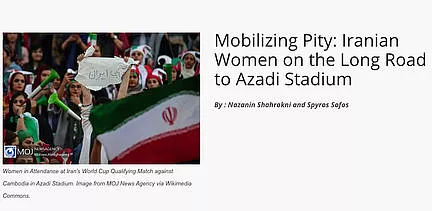"On 9 September 2019, Sahar Khodayari (later nicknamed the Blue Girl in a nod to the colors of her favorite soccer team) was unexpectedly hurled into the limelight. Sahar died in a hospital after setting herself on fire outside a courthouse in Tehran. For activists opposing Iran’s infamous ban on women entering soccer stadiums, on the grounds that it is religiously unacceptable and renders them vulnerable to physical and verbal abuse, she was a victim of state policy. Six months prior, in March 2019, Sahar, dressed as a man, had attempted to enter Azadi Stadium to watch a match of Asian Football Confederation Champions League between the United Arab Emirates team al-Ain and her favorite Iranian team Esteghlal (meaning independence) at Azadi (meaning freedom). She was (reportedly) identified, detained, and subsequently released—but was told she had to appear in court at a later date. No one knows what precisely transpired between her initial detention in March and her death in September. In fact, there was no media attention until after a picture of her charred body went viral. What brought her to the courthouse that Monday in September is not clear either."
(Women in Attendance at Iran's World Cup Qualifying Match against Cambodia in Azadi Stadium. Image from MOJ News Agency via Wikimedia Commons.)


